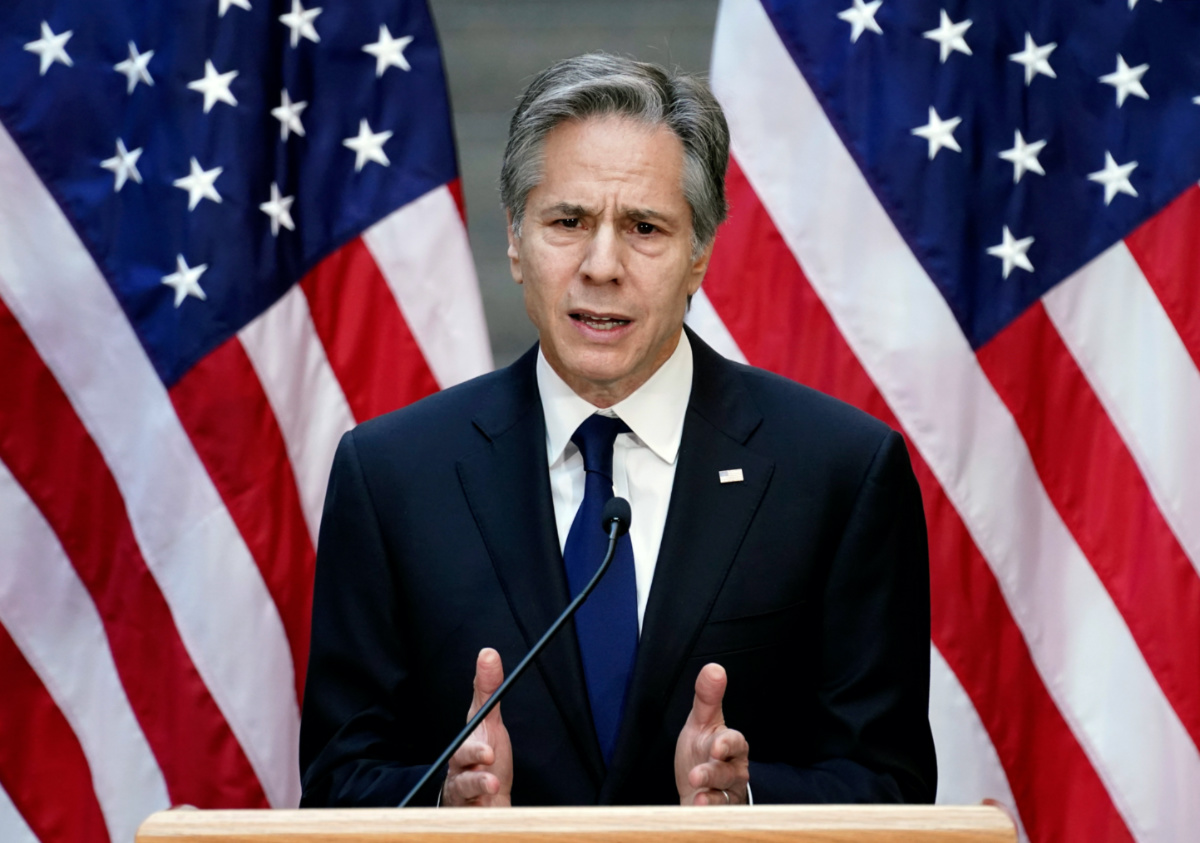
KNOX THAMES, US State Department special adviser on religious minorities in the Obama and Trump administrations, looks, in an article first published on Religion News Service, at whether such designations help…
United States
RNS
Last week, the State Department deployed its most potent tool in its religious freedom toolbox when it released its latest list designating the worst violators of religious freedom worldwide. In what has become an annual ritual, interested observers welcomed new additions and bemoaned notable exclusions, and as usual they make good points.
But the designations beg the question – do they help?

Secretary of State Antony Blinken speaks, seen after viewing the “Burma’s Path To Genocide” exhibit at the United States Holocaust Memorial Museum in Washington, on 21st March. PICTURE: Kevin Lamarque, Pool via AP)File photo.
Under the International Religious Freedom Act of 1998, the US Secretary of State is authorised to blacklist countries that severely violate the freedom of religion or belief. Blacklisting allows the State Department to levy sanctions, though most administrations have waived any punitive action, or simply piggyback religious freedom sanctions on pre-existing penalties against blacklisted states.
Still, no other country has such a mechanism, which enables the United States to shine a light on abuse.
“Under the International Religious Freedom Act of 1998, the US Secretary of State is authorised to blacklist countries that severely violate the freedom of religion or belief. Blacklisting allows the State Department to levy sanctions, though most administrations have waived any punitive action, or simply piggyback religious freedom sanctions on pre-existing penalties against blacklisted states.”
On Friday, Secretary of State Antony Blinken designated 12 countries as “countries of particular concern,” signifying they are the worst of the worst. Burma, China, Eritrea, Iran, North Korea, Pakistan, Russia, Saudi Arabia, Tajikistan and Turkmenistan have appeared on the list before. Cuba and Nicaragua were new additions. Blinken named Algeria, the Central African Republic, Comoros and Vietnam to the Special Watch List, a second tier of violators.
Blinken also identified “Entities of Particular Concern” – non-state actors who severely violate religious freedom. The list included al-Shabaab in Somalia, Boko Haram in Nigeria, Hayat Tahrir al-Sham, the Houthis in Yemen, ISIS-Greater Sahara, ISIS-West Africa, Jama’at Nusrat al-Islam wal-Muslimin, the Taliban and the Wagner Group “based on its actions in the Central African Republic”.
Overall, the announcement contains hits and misses. The United States designating countries like China and Russia doesn’t surprise, based on current global events. The redesignation of nations such as Pakistan and Saudi Arabia, both pivotal players in US foreign policy, however, demonstrates a willingness to name friend and foe alike. Naming Russia’s Wagner Group recognised a Western nonstate group as a persecutor for the first time.
Many welcomed Vietnam’s appearance on the Special Watch List, though many advocates believed it deserved redesignation as a CPC, which it was in 2004-5. Boat People SOS, a group focused on human rights violators in the country, and Abraham Cooper, vice chair of the US Commission on International Religious Freedom, both welcomed the decision while believing, in Cooper’s words, that “conditions in Vietnam meet the CPC standard”.
But others pointed out several glaring omissions, foremost India and Nigeria’s absence on all lists. “USCIRF Outraged by Omission of Nigeria and India from State Department’s List of Countries of Particular Concern,” said the commission’s press release, and its chair, Nury Turkel, stated, “There is no justification for the State Department’s failure to recognize Nigeria or India as egregious violators of religious freedom, as they each clearly meet the legal standards for designation as CPCs.”
The fact that Blinken chose not to name either country to even the lower Special Watch List is deeply problematic. Their trendlines are unmistakably in the wrong direction. Certainly, policymakers in Washington have high hopes for both countries for expanding US influence in Africa and Asia, but ignoring their persecution of Christians, Muslims and atheists hinders effective partnership.
Likewise, Blinken’s relisting of the Taliban as an entity of particular concern pulled a punch. With their uncontested control of Afghanistan, the Taliban are the de facto power, no longer hiding in caves. Their inclusion on the CPC list would have been stronger, which the United States did before 9/11 without recognising their “government.”
The State Department’s choices on these violators not only fails to deliver appropriate messages of concern, they hinder proactive diplomacy and weaken the United States’ leverage abroad.
This is important because in my two decades in government working on these issues, I have found that these lists do help – but only if they are followed up with consequential diplomacy. These designations are just one tool, and they need to be used. They will not work if they are regarded as boxes to check.
We rely on our readers to fund Sight's work - become a financial supporter today!
For more information, head to our Subscriber's page.
In Uzbekistan, the Trump administration used Uzbekistan’s CPC designation to bring about long-needed reforms, but also worked with new leadership in Tashkent that was looking to reset relations. Without CPC and the threat of penalties, change would not have come as far or as fast.
Similarly, in Vietnam and elsewhere, the State Department and US religious freedom ambassador Rashad Hussain have an opportunity to complement listing or delisting with energetic diplomacy to create political will where none exists.
India, Nigeria and others will require energetic advocacy. The downside of having these lists is that countries that escape them hear an unmistakable message that religious persecution ranks low in the hierarchy of priorities.
In the State Department release, the secretary said the United States will “regularly engage countries about our concerns regarding limitations on freedom of religion or belief, regardless of whether those countries have been designated.”
Hopefully so, but better if backed by consequences.

Knox Thames, the State Department special adviser on religious minorities in the Obama and Trump administrations, is writing a book on ending religious persecution. Follow him on Twitter @KnoxThames.






